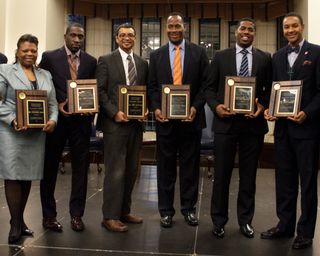It'shard to anticipate your next step if you've never done something before, oreven seen someone go through it. The prospect of graduating - high school,college, medical school - can be daunting if you're going through it alone orunassisted, if you’re the first generation to pursue a degree, or if you’retrying to counteract the growingeducational gaps between high- and low-income students. A series of PennMedicine programs are all aimed at confronting the steep learning curve andhelping smooth the way at every step - applications, financial aid,matriculation and beyond - and collectively demonstrate one professor's ongoingefforts to break down barriers along the way.
RoyHamilton, MD,assistant professor of Neurology and director of Pipeline Initiatives for thePerelman School of Medicine's Council for Diversity and Inclusion, hascultivated a handful of education and outreach programs that extend from highschool through medical school and residency. Through exposure, mentorship, andeducation, his efforts are helping to prepare students before they get to thenext step, so they can anticipate and succeed along the way.

Dr. Roy Hamilton (3rd from left) receives 2013 University of Pennsylvania Dr. Martin Luther King, Jr. Commemorative Award for Community Service.
Forall his efforts to educate and help young people advance to next stage of theircareer , Dr. Hamilton recently was awarded the 2013 University's Dr. MartinLuther King, Jr. Commemorative Award for Community Service. Dr. Hamiltonwas selected among the many nominees for the award, which reflects exemplarywork that people do across the University for members in their communities,going above and beyond their job description.
"Manystudents of any level with disadvantaged backgrounds don't know the game when theystart playing it," said Dr. Hamilton. "We're collectively trying tohelp students and trainees overcome the barriers that separate them fromsuccess when they transition from one step of career to the next."
Inthe Penn Medicine Educational Pipeline program, students at Sayre High Schoolin West Philadelphia go through a multi-tiered mentorship program. Inpartnership with Penn's Netter Center for Community Partnerships, Pennundergraduates spend the fall semester tutoring students on health and scienceat Sayre High School. In the spring, approximately 20 high schoolers mostinterested in health-related issues and medical science are invited to come tothe Penn campus for an after school program in medical school lab andclassrooms in an immersive experience mimicking what it's like to be at thePerelman School of Medicine. For some, it's the first time they've set foot oncampus, even though they’ve grown up just blocks away. The spring semestergives an opportunity for medical students to teach the high schoolers aboutspecific topics and systems-related material in medicine (such as the brain orgastrointestinal system), while exposing teens to what could be future steps intheir education.
Inthe summer, a mentorship program run by the Penn Provost's office draws highschool students from across the Philadelphia School District. This program wasmodeled in part after the Penn Medicine Educational Pipeline program and wasinitially started with three professional school partners from across theUniversity, including Medicine. Now, more of Penn's professional schools eachhave their own programs. In this program, 12-15 students are selected to cometo the Perelman School of Medicine all day throughout the summer for animmersive medical school experience. A strong shadowing portion pairs studentswith physicians in their particular area of interest.
Formedical students in the Perelman School of Medicine, Dr. Hamilton andcolleagues host an academic career seminar series that shows students the stepsalong various different career paths. This shows the variations in experiences,even for people on a similar path, that help the students prepare forresidencies, specialties and careers in research, education and or clinicalcare.
"This series allows us to share what we wish we'd knownwhen starting our medical careers, and what we would do differently duringmedical school to develop accordingly," explains Dr. Hamilton. "Evenin the same medical specialty, a basic scientist leads a very different lifethan an academic clinician. We bring in faculty from variety of career paths,and show the medical students what the currency of success is for that personand field."